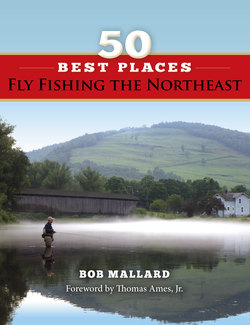Читать книгу 50 Best Places Fly Fishing the Northeast - Bob Mallard - Страница 23
На сайте Литреса книга снята с продажи.
Оглавление1 . Maine Arctic Char Ponds
Location: Central and Northern Maine, about a 2- to 3-hour ride from Bangor; a 3- to 4-hour ride from Portland; and a 4- to 5-hour ride from Boston, Massachusetts or Manchester, New Hampshire. Full-service airports are available in all four cities. Float plane pickup from lakes within an hour of Bangor can be arranged.
Maine is home to one of the rarest salmonids in the country—and by far the rarest salmonid in the Northeast. Formerly called blueback trout (and Sunapee trout in New
Hampshire and Vermont), these fish are now collectively referred to as Arctic char. Self-sustaining native Arctic char are now extant in no more than 12 waters in the continental United States—all of which are in Maine. Two of these have recently suffered introductions of invasive baitfish, forcing costly reclamation efforts to restore the fisheries and preserve the unique genetics.
There are several other viable—albeit introduced—populations of Arctic char in Maine as well. A few more waters are rumored to have char, with no record of them ever having been stocked. Of the roughly 20 waters where native Arctic char still exist, have been introduced, or have been documented as having a presence, no more than 10 are places where you could reasonably expect to encounter one while fishing. The rest are long shots at best.
According to the Maine Department of Inland Fisheries & Wildlife, there are 14 lakes and ponds in the state that contain Arctic char. This encompasses nearly 10,000 acres of water. Twelve are considered relic—or native. Two are the result of introductions involving fish trapped from Floods Pond. Nine are classified as Principal Fisheries, meaning that an angler has a reasonable chance of catching an Arctic char there. There are no plans for the further expansion of char.
Green Lake near Acadia National Park is a unique case. It has what is classified as a native Arctic char population. It is also one of just four native landlocked salmon lakes in Maine—and the only one where char and landlocked salmon historically overlapped. Green
Lake is a native rainbow smelt water as well. Smelt introductions have been responsible for the demise of Arctic char populations in other waters. The char in Green Lake are smaller than those found in other waters. This makes some question if they are not in fact dwarf Arctic char, which would make them arguably the rarest salmonids in the continental United States.
Big Reed Pond, in the northern part of the state, is ground zero for native char in Maine. The Nature Conservancy owns the land around this jewel of a pond,
Big Reed Pond. Bob Mallard
which also includes an equally rare stand of virgin, old-growth mixed forest. Unfortunately, Big Reed Pond was one of the two waters that recently succumbed to an introduction of invasive smelts. As part of a multi-agency effort that included The Nature Conservancy, Trout Unlimited, and the Maine Department of Inland Fisheries & Wildlife, along with support from local sporting camps, guides, and anglers, workers were able to trap char from the pond, isolate them in a hatchery, hatch and rear enough fish to use as seed stock, reclaim the pond, and successfully restore this invaluable population of rare fish, all while keeping the genetics intact.
One of the most intriguing things about Arctic char is that these rare and beautiful fish are found within a few short hours of Boston and only an hour’s flight from
